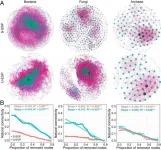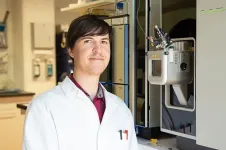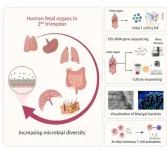How long-known genes continue to surprise researchers
Neurobiology
2021-06-16
(Press-News.org) These findings were published in the journal Cellular and Molecular Life Sciences on 8 June 2021.
Huge splicing diversity in the brain
The human genome was sequenced around 20 years ago. Since then, the sequence information encoding our proteins is known - at least in principle. However, this information is not continuously stored in the individual genes, but is divided into smaller coding sections. These coding sections, also known as exons, are assembled in a process called splicing. Depending on the gene, different exon combinations are possible, which is why they are referred to as different or alternative splicing combinations.
Almost all 20,000 human genes can be alternatively spliced. A particularly huge variety of different splice variants is found in the brain, which allows for creating a huge diversity and allows to adapt the proteins to specific requirements. "However, it is not easy to determine, which protein variants are actually present," says Andreas Reiner. "Sequencing of already-spliced messenger RNAs (mRNAs), so-called RNA-Seq data, which are now increasingly being obtained with high-throughput approaches, offers a way out." Robin Herbrechter and Andreas Reiner now used such data to obtain an overview of all ionotropic glutamate receptor splice variants.
New glutamate receptor variants detected
Using bioinformatic methods, the researchers aligned billions of mRNA sequence snippets to the genome to reconstruct the frequency of individual splice events. This method also enabled them to detect new, previously unknown splice variants. There were quite a few surprises: the systematic analysis showed that some variants found in the previously studied model organisms mouse and rat do not occur in humans at all, or are much less abundant than previously assumed.
"Among the newly identified isoforms, some are particularly exciting, as they are quite different from the previously known variants and could thus have new functions," says Robin Herbrechter. This includes a protein domain formed by the gene of the GluA4 AMPA receptor, as well as the first description of a delta receptor 1 (GluD1) isoform. While the focus will now be on analysing these variants, also further bioinformatic analyses are planned, for example to determine which cell types produce the different splice variants.
INFORMATION:
ELSE PRESS RELEASES FROM THIS DATE:
2021-06-16
With increasing vaccination rates and decreasing numbers of infections, the population's feeling of safety is also rising. As the results of the 37th edition of the BfR-Corona-Monitor, a regular survey conducted by the German Federal Institute for Risk Assessment (BfR), show, the majority of the population in Germany thinks it can control its risk of an infection well. "62 percent are confident that they can protect themselves from an infection with the coronavirus," says BfR-President Professor Dr. Dr. Andreas Hensel. "We see that the feeling of safety has increased considerably. ...
2021-06-16
Chinese researchers have recently discovered links between reduction in microbial stability and soil carbon loss in the active layer of degraded alpine permafrost on the Qinghai-Tibet Plateau (QTP).
The researchers, headed by Prof. CHEN Shengyun from the Northwest Institute of Eco-Environment and Resources (NIEER) of the Chinese Academy of Sciences (CAS), and XUE Kai from University of Chinese Academy of Sciences, conducted a combined in-depth analysis of soil microbial communities and their co-occurrence networks in the active permafrost layer along an extensive gradient of permafrost degradation.
The QTP encompasses the largest extent of high-altitude mountain ...
2021-06-16
Greater Helsinki -- Transitioning to low-carbon energy production is the biggest climate challenge to overcome. Many countries are already looking to adopt clean heating solutions more widely, with the International Energy Agency projecting that by 2045 nearly half of global heating will be done with heat pumps. To ensure speedy uptake, governments are likely to offer subsidies to ensure these energy-efficient options actually make their way into homes and offices.
A new study from Aalto University assesses the impact of heat pumps on energy consumption as well as how ...
2021-06-16
Research published in the journal ACS Materials and Interfaces has provided new understanding of how false-negative results in Lateral Flow Tests occur and provides opportunity for simple improvements to be made.
Lateral Flow Devices were introduced late in 2020 on a global scale to help detect novel coronavirus infection in individuals, with test results produced rapidly in half an hour or less. However, their potential has been somewhat hindered by inadequate sensitivity, with a high number of false-negative results.
Using X-ray fluorescence imaging from Diamond Light Source, researchers from King's College London ...
2021-06-16
Researchers from the University of Kent's School of Psychology have found that when people are presented with the idea of a Covid-19 "immunity passport", they show less willingness to follow social distancing and face covering guidelines. However, this willingness seems to return when people read more cautious information about Covid-19 immunity.
PhD students Ricky Green and Mikey Biddlestone and Professor Karen Douglas asked participants from the UK and USA to imagine they had either recovered from Covid-19 or were currently infected. Participants asked to imagine ...
2021-06-16
Several different causes of ageing have been discovered, but the question remains whether there are common underlying mechanisms that determine ageing and lifespan. Researchers from the Max Planck Institute for Biology of Ageing and the CECAD Cluster of Excellence in Ageing research at the University Cologne have now come across folate metabolism in their search for such basic mechanisms. Its regulation underlies many known ageing signalling pathways and leads to longevity. This may provide a new possibility to broadly improve human health during ageing.
In recent decades, ...
2021-06-16
In an international study published by the journal Environment International, the University of Surrey led an international team of air pollution experts in monitoring pollution hotspots in 10 global cities: Dhaka (Bangladesh); São Paulo (Brazil); Guangzhou (China); Medellín (Colombia); Cairo (Egypt); Addis Ababa (Ethiopia); Chennai (India); Sulaymaniyah (Iraq); Blantyre (Malawi); and Dar-es-Salaam (Tanzania).
Surrey's Global Centre for Clean Air Research (GCARE) set out to investigate whether the amount of fine air pollution particles (PM2.5) drivers inhaled is connected to the duration drivers spend in pollution hotspots and socio-economic indicators such ...
2021-06-16
2 June 2021, Singapore - The human fetal immune system begins to develop early during gestation, however, factors responsible for fetal immune-priming remain elusive. Using multiple complementary approaches, Dr Florent Ginhoux from A*STAR's Singapore Immunology Network (SIgN), Professor Jerry Chan from KK Women's and Children's Hospital (KKH), Professor Salvatore Albani from the SingHealth Duke-NUS Translational Immunology Institute, with collaborators from Cambridge University explored potential exposure to microbial agents in-utero. The team identified live microbes across fetal organs that stimulate activation of fetal T-cells during the second trimester of gestation. Study published in scientific journal, Cell, on 24 June 2021.
The team profiled microbes ...
2021-06-16
Do you like the thick brush strokes and soft color palettes of an impressionist painting such as those by Claude Monet? Or do you prefer the bold colors and abstract shapes of a Rothko? Individual art tastes have a certain mystique to them, but now a new Caltech study shows that a simple computer program can accurately predict which paintings a person will like.
The new study, appearing in the journal Nature Human Behaviour, utilized Amazon's crowdsourcing platform Mechanical Turk to enlist more than 1,500 volunteers to rate paintings in the genres of impressionism, cubism, abstract, and color field. The volunteers' answers were fed into a computer program and then, after this training period, the computer ...
2021-06-16
Chatbots hold promise for dementia patient or caregiver support, but are still in their infancy, finds a paper published in the Journal of Medical Internet Research. None of the interactive digital apps tested by medical researchers and a computer scientist performed well on all testing criteria, and all the apps contained linguistic biases and usability challenges. The authors conclude that until developers produce evidence-based chatbots that have undergone end user evaluation it will be hard to evaluate their potential to adequately educate and support dementia patients and their caregivers.
"Dementia care is complex and no two cases of dementia are alike. Chatbots have the potential of providing ...
LAST 30 PRESS RELEASES:
[Press-News.org] How long-known genes continue to surprise researchers
Neurobiology



